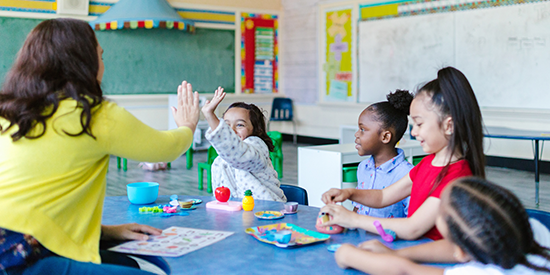Prepping for back-to-school? 3 ways to support educators during the Omicron wave
Research news
As Australian schools are preparing to open their classrooms for term one, concerns about Omicron transmissions grow. A Deakin expert shares some ways to support educators in your community.
If remote learning has shown parents anything, it is a renewed appreciation for the job that teachers do. As millions of Australian students return to schools, the significant Omicron caseloads are creating a growing anxiety for many young people, families and teaching professionals.
As classrooms re-open, how can we support teachers in this new wave of the pandemic? The question of how to promote the development of safe, healthy work environments for educators and their communities is of particular interest for Deakin University’s Educator Health and Wellbeing team within the Research for Educational Impact, Deakin’s Strategic Research Centre in Education.
Formed by Professor Phil Riley in 2018, the Educator Health and Wellbeing team track education professionals working environments and health and wellbeing over time.
Currently they are undertaking research with educators at all levels of the education system, from early childhood through to tertiary education, to investigate how their workplace and work tasks impact on their mental and physical health.
Dr Ben Arnold, a postdoctoral research fellow working on educator occupational health, safety and wellbeing, provides some strategies to show your support during the back-to-school transition whether you’re a parent or student.

1. Respect educators’ professionalism and expertise
Allow school employees to draw on their expertise and experience as they manage the return to school this year. Plans and responses will be different across schools.
Over the last two years, the COVID-19 pandemic has severely disrupted the work of education professionals.
Schools have had to respond to rapidly changing guidelines and circumstances; adopt complex remote and hybrid teaching and learning practices; provide emotional support to school communities that are coping with fear and illness; and work in isolation from colleagues for extended periods.
Our research shows that this has led to less predictable and more fluid work environments for education professionals.
2. Be present and patient
Manage your expectations and appreciate that employees in schools are working in unprecedented circumstances and are contending with numerous additional pressures and responsibilities.
School employees will be required to perform their usual teaching duties, and enforce mask wearing, physical distancing and hygiene practices whilst providing social and emotional support to students and the wider school community during the peak of the Omicron outbreak.
3. Value teaching professionals work
Continue to develop your understanding of the work that education professionals do and support the professional status of those working in the education sector.
Despite growing public recognition of the teaching profession, only 45% of Australian teachers report feeling that the profession is valued in society (OECD, 2018).
Dr Arnold and his colleagues are set to share the results of their two latest surveys in early 2022, they are: the New Zealand Primary Principal Occupational Health, Safety and Wellbeing Survey and the New Zealand Primary Teacher Occupational Health, Safety and Wellbeing Survey.
More information:
- How is principal health and wellbeing tracking in 2021?
- The education minster wants graduate teachers to be ‘classroom ready’. But the classroom is not what it used to be
Share this story

Key Fact
An expert from Deakin's Educator Health and Wellbeing provides insight into supporting our educators during the back-to-school season.
